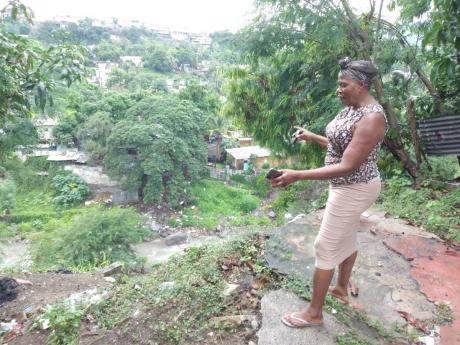When it rains, it pains
Every time it rains, anxiety overwhelms Carleen Dyce, a resident of the hilly Kintyre community in the St Andrew East Rural constituency, an area that has suffered from landslides for years.
Dyce once enjoyed a sizeable backyard that has now been swallowed by the Hope River, which has denuded hillsides.
During her 18 years living in Kintyre, Dyce has watched as her family has been drawn into a never-ending nightmare that has swept away trees and swathes of soil.
“Several houses were below me. They even used to raise cows below there, and since about maybe six or seven years ago, the place keep tearing away,” Dyce told The Gleaner.
“As soon as the rain fall, house gone down and big trees too. We lose about six houses from here since I am here. It is very scary. Right now, I am very scared.”
Dyce’s dilemma is part of a national conversation that has divided opinions on why mainly poor householders build residences on marginal land.
Member of Parliament Juliet Holness, within whose constituency Kintyre falls, has warned persons against committing building breaches that threaten life and limb. But others argue that the historical legacy of slavery and poverty has cast aside the underclass to the edge of survival.
Dyce says that her family did not tempt fate.
“We used to sit down under a mango tree further out and the mango tree gone. Sometimes people may say how we build on the riverbank, but this wasn’t anything like a riverbank. This was a nice piece of land, but all of a sudden it start going down,” she added.
Like thousands across Jamaica, Dyce said she is desperate to move out but doesn’t have the money to budge. Losing her job because of COVID-19 has only made matters worse.
Luke Marsh, who is almost 50, has spent his entire life in Kintyre. He gave the Gleaner news team a tour of the area, showing how the Hope River had swelled its girth, destroying retaining walls and engorging itself on everything in its path.
“During one of the storm dem, water come all the way up yah suh come buss up di house. Water destroyed it and tek weh wah it fi tek weh and gone wid it ... .
“A lot of house used to be on the bank. Up to this tree in the river, land used to be there,” Marsh, a Rastafarian, said, recalling that at about five houses had gone into a watery grave at a section of the community.
RIVER TRAINING NUB OF PROBLEM
Environmentalist and development scientist Peter Espeut is inclined to side with Marsh and Dyce’s theory of displacement. In his opinion, river training is the nub of the problem.
Espeut believes that Jamaicans should be as insistent on governments to tame rivers emboldened by tempests as they pressure the authorities to clean drains.
“What the governments over the decades have done, they have put gabion baskets on the side of the river to prevent the banks from eroding. Now the rivers ... are out of control,” Espeut said.
But Espeut acknowledges that the budgetary realities in a developing country just emerging from decades of economic malaise had compromised efficient management of the scenario.
“I would say that governments have failed to do river training, but they might argue that if they really train every river in Jamaica for a flood like this, the whole budget of the country would go in just river training alone,” he quipped.
Espeut has little confidence in the recent warning by Prime Minister Andrew Holness that his administration would be pursuing no-build zones to deter people from living in dangerous places. He views Holness’ vow as bluster - similar to the decades-long pledges by previous political leaders to regularise shanty towns like Mona Common in Papine.
Electoral fortunes have likely held sway in those decisions, but Mrs Holness, the prime minister’s wife, has said that she is willing to lose votes in a bid to save lives. She said she will report lawbreakers herself to the municipal authorities.
But Espeut is unconvinced that there will be a critical mass of support among fellow parliamentarians for Mrs Holness’ call to action.
“I know that these people vote for my party. If I move them over there, I lose them because it’s out of my constituency. ... That means a next person is going to get those votes, and when I subtract them, I might lose the seat,” Espeut said.

